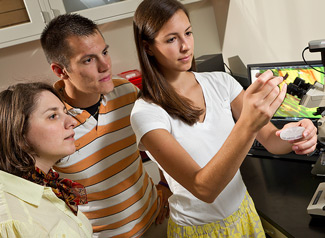The future of organic materials
Maggie Payne is helping to develop a new generation of flexible electronics.
A junior physics major, Payne is part of a team of researchers at Wake Forest University’s Organic Electronics group studying the relation between the physical structure and electrical properties of organic semiconductor crystals. The team’s work is contributing to advances in organic semiconductor technology that could one day lead to video screens that bend like paper and electronics sewn into clothing.
Payne grows crystals in the lab and applies them to semiconductors to test how well they conduct electricity. She said modeling and theoretical findings predict the compounds she is growing could have a variety of electrical properties ranging from bipolarity to superconductivity.
Payne said she owes her early involvement in cutting edge research to her mentor, Oana Jurchescu, an assistant professor of physics and director of the research team. “Dr. Jurchescu has inspired me as a strong female physicist,” Payne said. “Working in her lab group is one of the best experiences I have had at Wake Forest.”
Jurchescu mentors many graduate and undergraduate students like Payne, who are interested in conducting research on organic semiconductors and pursuing careers in science. Her work both in the classroom with students and in the lab was recently recognized with a $400,000 National Science Foundation CAREER Award, the most prestigious national award the NSF offers a few select junior faculty who excel as teacher-scholars. Jurchescu said her team will use the money to elucidate the intrinsic characteristics of single crystals and provide feedback for the development of novel, high-tech electronics and thin film devices.

(From left) Jurchescu with graduate students Jeremy Ward and Katelyn Goetz in the Center for Nanotechnology and Molecular Materials.
Current technology utilizes inorganic semiconducting materials like silicon, which are expensive and limited in their application because they must be processed in a vacuum at high temperatures. Compared to these materials, organic semiconductors are less expensive, easier to process, and more versatile. “Fast deposition at up to a hundred feet per second may allow their production in large volumes and at low cost per unit area, an introduction of ‘electronics everywhere,” Jurchescu said.
Examples of the potential technology include transparent solar cells on building windows, car roofs and bus stations, electronic displays in previously inaccessible spaces, and wearable electronics due to the organic plastics’ thin, lightweight and conformal nature.
The NSF CAREER Award recognizes and encourages excellent teaching, mentorship and community outreach. In line with these objectives, Jurchescu will offer a new course focused on carbon-based materials and devices, tentatively scheduled for the 2014-2015 academic year. She will give demonstrations on nanotechnology to children at Nanodays at Sciworks, a science and environmental center in Winston-Salem, and host research projects in her lab for motivated high school students and students from Forsyth Tech Community College as well.
Additionally, Jurchescu will continue to mentor Wake Forest students like Payne, who said she owes her decision to follow a career path in physics to her mentor.
“She not only has an extensive understanding of the material but is equipped with the skills of communicating her knowledge,” Payne said. “She may or may not know this, but Dr. Jurchescu’s Electronics course was the reason I became a physics major. She is a role model to me a both a woman and a physicist.”
Categories: Experiential Learning, Mentorship, Research & Discovery, University Announcements
Media Contact
Wake Forest News
media@wfu.edu
336.758.5237



